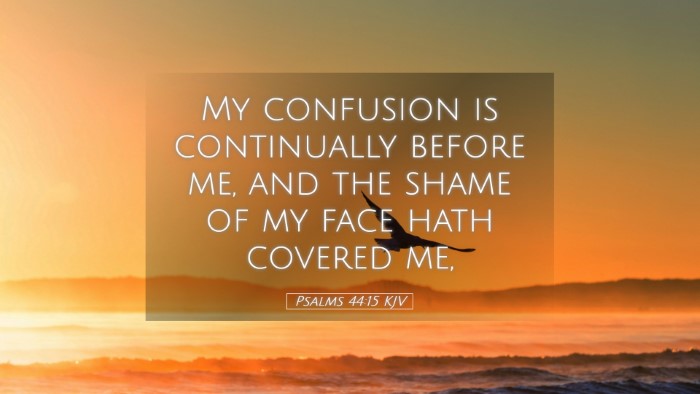Psalms 44:15 - A Deep Dive into Divine Distress
Psalms 44:15 states, "My confusion is continually before me, and the shame of my face hath covered me," illustrating the deep emotional and spiritual turmoil faced by the psalmist. This verse resonates with themes of distress, shame, and the quest for understanding in difficult circumstances. Various commentaries shed light on the implications of this verse, highlighting the inner struggles related to both personal and collective experiences of the Israelites.
Contextual Background
To understand Psalms 44:15, one must consider the broader context of Psalm 44. This psalm is seen as a communal lament, expressing the collective struggles of the Israelites. The psalmist recalls past victories attributed to God's intervention but contrasts that with the current state of suffering and apparent abandonment. The psalmist's identification with the people’s shame and confusion portrays a deep emotional connection to both individual and collective identity within the faith community.
Matthew Henry's Commentary
Matthew Henry focuses on the emotional weight carried by the psalmist. He interprets “confusion” as a state of perplexity and dismay, highlighting how profound external circumstances lead to an internal sense of shame. He points out that the emotional burden of the past is present in the psalmist's heart:
- Perplexity of Heart: Henry notes that confusion often arises when God's presence seems withdrawn during trials, leading to an inner turmoil that the faithful seldom understand.
- Shame and Guilt: The psalmist's shame could be seen as a reflection of the people's collective guilt, potentially for turning away from God, which brings deep distress.
- Restoration Hope: Despite this, Henry emphasizes that such psalms often lead to a hopeful restoration, where the acknowledgment of distress becomes a pathway to seeking God's face.
Albert Barnes' Commentary
Albert Barnes delves into the psychological and cultural dimensions of the feelings expressed. He sees the shame mentioned as a public reaction to suffering, indicating:
- Public Perception: The shame of the face suggests a societal implication where suffering is often equated with divine displeasure, thus making the psalmist feel alienated.
- Divine Abandonment: Barnes argues that the confusion felt by the psalmist signals a perceived absence of God’s usual protection and favor which breeds despair.
- Call for Understanding: Barnes emphasizes the plea for enlightenment regarding the reasons behind their suffering, reflecting a desire for a return to God’s favor.
Adam Clarke's Commentary
Adam Clarke’s insights highlight the theological implications of the verse, emphasizing the depth of the psalmist's anguish amidst confusion:
- Identity Crisis: Clarke remarks that the depths of confusion can lead to a spiritual identity crisis for the community; recognizing suffering can distort the understanding of God's character.
- Shame as a Catalyst for Reflection: The shame mentioned is not solely negative; it provides a moment of reflection, leading the psalmist and the community to reassess their spiritual lives and commitments.
- Engagement with God: Clarke posits that such expressions of distress are necessary for the community’s spiritual engagement with God, serving as a precursor to renewal and revival.
Thematic Reflections
Integrating the insights from these commentaries, several themes emerge regarding human experience in relation to divine interaction:
- The Nature of Distress: Distress often leads to a deeper understanding of one’s reliance on God. The psalmist represents the struggle between faith and feelings of abandonment.
- Collective Shame and Identity: The notion of collective identity in faith communities is highlighted, where individual struggles can lead to a shared sense of shame and confusion.
- Hope Amid Confusion: At the core of lament is hope—there's recognition that expressing these feelings can foster restoration and a yearning for divine intervention.
Conclusion
Psalms 44:15 encapsulates the profound emotional turmoil that often accompanies spiritual crises, as reflected in the rich insights from historical commentaries. For pastors, students, theologians, and scholars, it serves as a reminder that confusion and shame are frequent spiritual companions, illuminating the necessity of honest lament in our spiritual journeys. By engaging with these feelings, the faithful may rediscover restoration and divine presence.


